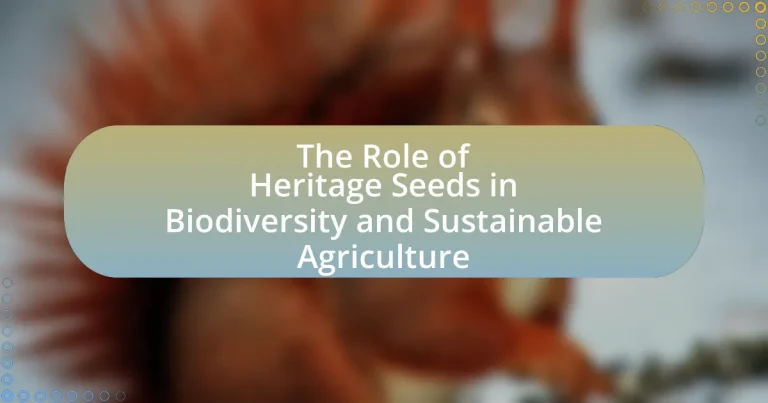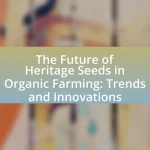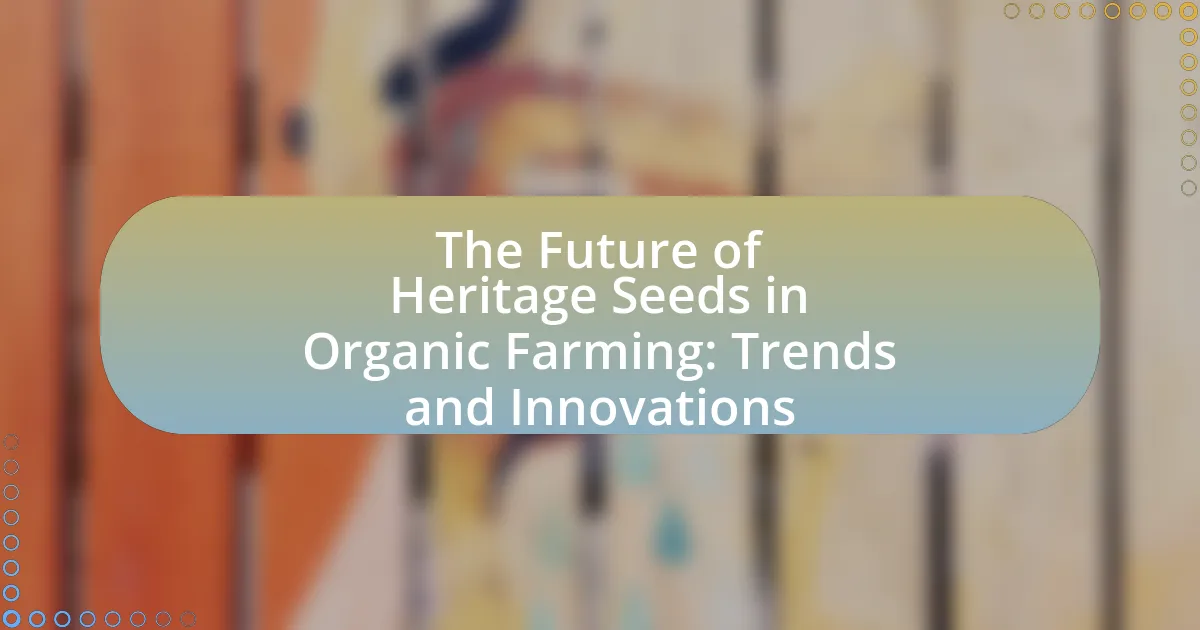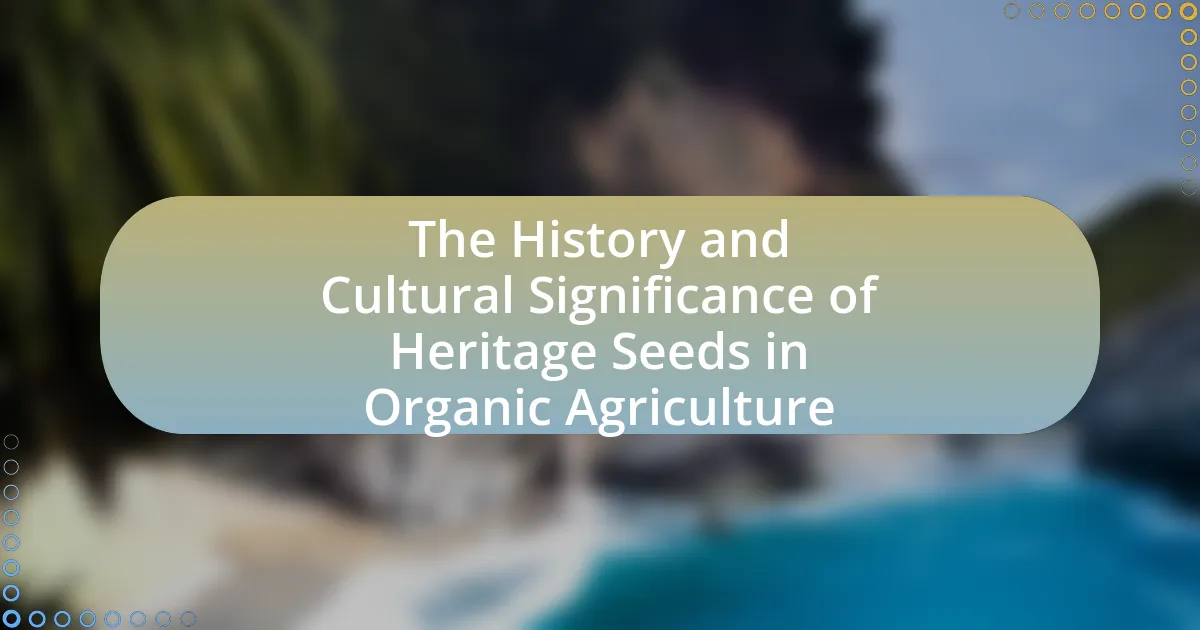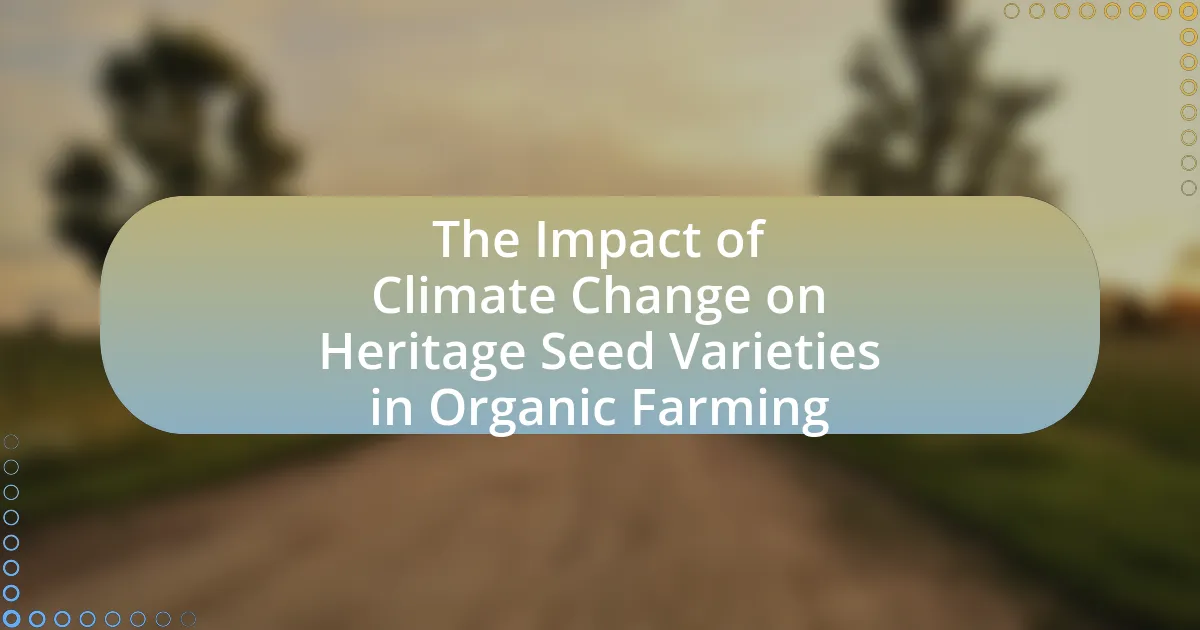Heritage seeds are traditional, open-pollinated varieties that have been cultivated over generations, known for their adaptability, resilience, and genetic diversity. This article explores the significance of heritage seeds in promoting biodiversity and sustainable agriculture, highlighting their role in enhancing soil health, reducing chemical inputs, and supporting food security. It contrasts heritage seeds with hybrid and GMO seeds, discusses their characteristics and resilience, and examines their contributions to genetic diversity and ecosystem stability. Additionally, the article addresses the economic benefits of heritage seeds, the challenges they face in modern agriculture, and the collaborative efforts needed for their preservation and integration into contemporary farming practices.

What are Heritage Seeds and Their Importance in Agriculture?
Heritage seeds are traditional varieties of seeds that have been passed down through generations, often characterized by their adaptability, resilience, and genetic diversity. These seeds are crucial in agriculture as they contribute to biodiversity, allowing for a wider range of crops that can thrive in various environmental conditions. The preservation of heritage seeds supports sustainable agriculture by promoting soil health, reducing dependency on chemical inputs, and enhancing food security. Studies indicate that heritage seeds can yield crops that are more resistant to pests and diseases, thereby reducing the need for synthetic pesticides. Additionally, the use of heritage seeds helps maintain cultural heritage and agricultural practices, fostering community resilience and self-sufficiency.
How do Heritage Seeds differ from Hybrid and GMO Seeds?
Heritage seeds differ from hybrid and GMO seeds primarily in their genetic makeup and breeding processes. Heritage seeds are open-pollinated varieties that have been passed down through generations, maintaining their genetic traits and adaptability to local conditions, while hybrid seeds are created through controlled cross-pollination of different plant varieties to produce specific traits, and GMO seeds are genetically modified organisms that have had their DNA altered in a laboratory to express desired characteristics. Heritage seeds promote biodiversity and are often more resilient to local pests and diseases, whereas hybrids may require specific conditions for optimal growth and GMOs can raise concerns regarding ecological impact and food safety.
What characteristics define Heritage Seeds?
Heritage seeds are defined by their open-pollinated nature, which allows them to be naturally pollinated and produce seeds that can be replanted with the same characteristics as the parent plant. These seeds are typically heirloom varieties, meaning they have been passed down through generations, often for at least 50 years, and are valued for their genetic diversity, adaptability to local conditions, and unique flavors. Heritage seeds contribute to biodiversity by preserving a wide range of plant varieties that are often more resilient to pests and diseases compared to modern hybrids.
Why are Heritage Seeds considered more resilient?
Heritage seeds are considered more resilient because they have been cultivated over generations, allowing them to adapt to local environmental conditions and resist pests and diseases. This adaptability is rooted in their genetic diversity, which enhances their ability to thrive in varying climates and soil types. Studies show that heritage varieties often exhibit greater resistance to environmental stresses, such as drought and extreme temperatures, compared to modern hybrids. For instance, research published in the journal “Agricultural Systems” highlights that heritage crops can maintain yields under adverse conditions due to their robust genetic traits.
What role do Heritage Seeds play in preserving biodiversity?
Heritage seeds play a crucial role in preserving biodiversity by maintaining genetic diversity within crops. These seeds are open-pollinated varieties that have been passed down through generations, often adapted to local climates and conditions. By cultivating heritage seeds, farmers contribute to the conservation of a wide range of plant genetics, which is essential for resilience against pests, diseases, and changing environmental conditions. Studies indicate that heritage seeds can enhance ecosystem stability and agricultural sustainability, as they support a diverse range of species and promote soil health.
How do Heritage Seeds contribute to genetic diversity?
Heritage seeds contribute to genetic diversity by preserving a wide range of plant varieties that have adapted to specific local environments over generations. These seeds maintain unique genetic traits that can enhance resilience against pests, diseases, and climate change, which is crucial for sustainable agriculture. For instance, a study by the Food and Agriculture Organization (FAO) highlights that heritage seeds can contain genetic variations that are not present in modern hybrid varieties, thus offering a broader genetic pool for breeding programs aimed at improving crop resilience and yield.
What ecosystems benefit from the use of Heritage Seeds?
Heritage seeds benefit agroecosystems, particularly those focused on sustainable agriculture and biodiversity conservation. These seeds promote genetic diversity, which enhances ecosystem resilience and adaptability to changing environmental conditions. Research indicates that heritage seeds can improve soil health and support local wildlife by providing diverse habitats and food sources. For instance, a study published in the journal “Agriculture, Ecosystems & Environment” highlights that farms utilizing heritage seeds can increase pollinator populations and beneficial insects, contributing to a more balanced ecosystem.

How do Heritage Seeds Support Sustainable Agriculture?
Heritage seeds support sustainable agriculture by promoting biodiversity and resilience in farming systems. These seeds are open-pollinated and have been cultivated over generations, allowing them to adapt to local environments and conditions. This adaptability enhances crop resilience against pests, diseases, and climate variability, reducing the need for chemical inputs and synthetic fertilizers. Research indicates that farms using heritage seeds can maintain higher levels of soil health and ecosystem services, contributing to sustainable practices. For instance, a study published in the journal “Agriculture, Ecosystems & Environment” highlights that diverse cropping systems, including heritage varieties, can improve soil structure and fertility, leading to more sustainable agricultural outcomes.
What practices in sustainable agriculture utilize Heritage Seeds?
Heritage seeds are utilized in sustainable agriculture practices such as crop rotation, intercropping, and organic farming. These practices enhance biodiversity, improve soil health, and promote resilience against pests and diseases. For instance, crop rotation with heritage seeds can lead to improved nutrient cycling and reduced soil erosion, as evidenced by studies showing that diverse cropping systems can increase yields and soil fertility over time. Additionally, intercropping with heritage varieties can enhance pest control and reduce the need for chemical inputs, aligning with sustainable agriculture principles.
How do Heritage Seeds enhance soil health?
Heritage seeds enhance soil health by promoting biodiversity and improving soil structure. These seeds are often adapted to local conditions, which allows them to thrive without the need for synthetic fertilizers or pesticides, thus fostering a more balanced ecosystem. Research indicates that diverse plant varieties contribute to healthier soil by increasing organic matter and enhancing microbial activity, which are crucial for nutrient cycling. For instance, a study published in the journal “Agriculture, Ecosystems & Environment” found that fields planted with diverse heritage crops showed a 20% increase in soil organic carbon compared to monoculture systems. This increase in organic matter not only improves soil fertility but also enhances water retention and reduces erosion, further supporting sustainable agricultural practices.
What are the economic benefits of using Heritage Seeds in farming?
The economic benefits of using Heritage Seeds in farming include increased crop resilience, reduced input costs, and enhanced market opportunities. Heritage Seeds are often more adaptable to local conditions, which can lead to higher yields and lower reliance on chemical inputs, thereby reducing overall farming costs. Additionally, farmers can tap into niche markets that value biodiversity and organic practices, often commanding higher prices for their produce. Studies have shown that farms utilizing Heritage Seeds can see a 20-30% increase in profitability due to these factors, as they cater to consumer demand for sustainable and locally sourced food options.
Why is the conservation of Heritage Seeds critical for future generations?
The conservation of Heritage Seeds is critical for future generations because it preserves genetic diversity essential for food security and resilience against climate change. Heritage Seeds, which are open-pollinated and often heirloom varieties, maintain unique traits that can adapt to varying environmental conditions, thus ensuring a stable food supply. According to the Food and Agriculture Organization, approximately 75% of global crop diversity has been lost since the 1900s, highlighting the urgent need to conserve these seeds to safeguard agricultural biodiversity. This genetic reservoir not only supports sustainable farming practices but also enables future breeding programs to develop crops that can withstand pests, diseases, and changing climates, ultimately benefiting future food systems.
What challenges do Heritage Seeds face in modern agriculture?
Heritage seeds face significant challenges in modern agriculture, primarily due to the dominance of hybrid and genetically modified organisms (GMOs). These modern varieties often outcompete heritage seeds in terms of yield, disease resistance, and market acceptance, leading to reduced cultivation and genetic diversity. Additionally, heritage seeds are often less commercially viable because they do not have the same shelf life or uniformity as hybrids, making them less appealing to large-scale agricultural operations. The loss of traditional farming practices and knowledge further exacerbates these challenges, as fewer farmers are familiar with growing and saving heritage seeds. According to a report by the Food and Agriculture Organization, the genetic diversity of crops has decreased significantly, with over 75% of crop diversity lost in the last century, highlighting the urgent need to support heritage seeds for sustainable agriculture.
How can farmers and communities work together to preserve Heritage Seeds?
Farmers and communities can work together to preserve Heritage Seeds by establishing seed banks and community gardens that focus on the cultivation and sharing of these seeds. Collaborative efforts can include organizing workshops to educate members about the importance of Heritage Seeds for biodiversity and sustainable agriculture, as well as promoting local seed exchanges to enhance genetic diversity. Research indicates that community-based seed initiatives can significantly contribute to the conservation of traditional varieties, as seen in projects like the Seed Savers Exchange, which has successfully preserved thousands of Heritage Seed varieties since its inception in 1975.
What are the Practical Applications of Heritage Seeds in Today’s Farming?
Heritage seeds are utilized in today’s farming primarily for their ability to enhance biodiversity, improve crop resilience, and support sustainable agricultural practices. These seeds, which are open-pollinated and often heirloom varieties, contribute to genetic diversity, allowing farmers to cultivate crops that are better adapted to local conditions and resistant to pests and diseases. For instance, studies have shown that heritage varieties can yield better results in organic farming systems, where chemical inputs are minimized, thus promoting soil health and ecosystem balance. Additionally, heritage seeds often have unique flavors and nutritional profiles, which can cater to niche markets and consumer preferences, further supporting local economies.
How can farmers effectively integrate Heritage Seeds into their practices?
Farmers can effectively integrate Heritage Seeds into their practices by adopting crop rotation and intercropping strategies that enhance biodiversity. These methods allow farmers to utilize the unique traits of Heritage Seeds, which are often more resilient to local pests and diseases, thereby reducing reliance on chemical inputs. Research indicates that Heritage Seeds contribute to soil health and ecosystem stability, as they are adapted to local conditions and promote genetic diversity. For instance, a study published in the journal “Agriculture, Ecosystems & Environment” highlights that farms using Heritage Seeds reported improved yields and reduced pest outbreaks compared to those using conventional seeds. By implementing these practices, farmers can enhance sustainability and preserve agricultural biodiversity.
What are the best methods for planting and cultivating Heritage Seeds?
The best methods for planting and cultivating Heritage Seeds include selecting appropriate planting sites, preparing the soil, using organic fertilizers, and practicing crop rotation. Heritage Seeds thrive in well-drained, nutrient-rich soil, which can be achieved by incorporating compost or organic matter before planting. Additionally, these seeds benefit from organic fertilizers that enhance soil health and promote biodiversity. Crop rotation is essential as it prevents soil depletion and reduces pest and disease pressure, ensuring a sustainable growing environment. Research indicates that these practices not only improve yield but also contribute to the preservation of genetic diversity in agriculture, which is crucial for long-term sustainability.
How can farmers ensure the quality and viability of Heritage Seeds?
Farmers can ensure the quality and viability of Heritage Seeds by implementing proper seed saving techniques, maintaining genetic diversity, and conducting regular germination tests. Proper seed saving involves selecting seeds from the healthiest plants, which helps preserve desirable traits and ensures that the seeds are adapted to local conditions. Maintaining genetic diversity is crucial, as it enhances resilience against pests and diseases, thereby improving overall crop performance. Regular germination tests, which involve assessing the percentage of seeds that sprout under controlled conditions, provide concrete data on seed viability, allowing farmers to discard non-viable seeds and retain only those that will produce healthy plants.
What resources are available for farmers interested in Heritage Seeds?
Farmers interested in Heritage Seeds can access a variety of resources, including seed banks, agricultural extension services, and online databases. Seed banks, such as the Seed Savers Exchange, provide a repository of diverse heritage seed varieties, ensuring preservation and availability. Agricultural extension services offer guidance on cultivation practices and the benefits of using heritage seeds, promoting sustainable agriculture. Online databases, like the USDA’s National Plant Germplasm System, provide detailed information on heritage seed varieties, including their characteristics and growing conditions. These resources collectively support farmers in adopting heritage seeds, enhancing biodiversity and sustainability in agriculture.
Where can farmers find Heritage Seed varieties?
Farmers can find Heritage Seed varieties at specialized seed banks, local agricultural cooperatives, and online seed retailers that focus on heirloom and heritage seeds. These sources often provide a diverse selection of seeds that have been preserved for their unique traits and adaptability. For example, organizations like Seed Savers Exchange and the USDA’s National Plant Germplasm System offer access to a wide range of heritage seeds, ensuring that farmers can cultivate traditional varieties that contribute to biodiversity and sustainable agriculture practices.
What organizations support the use of Heritage Seeds in agriculture?
Organizations that support the use of Heritage Seeds in agriculture include the Seed Savers Exchange, the Organic Seed Alliance, and the Biodynamic Farming and Gardening Association. These organizations advocate for the preservation and use of heritage seeds to promote biodiversity, sustainable farming practices, and food sovereignty. For instance, the Seed Savers Exchange focuses on conserving heirloom varieties and sharing seeds among gardeners and farmers, while the Organic Seed Alliance works to advance organic seed systems that include heritage varieties.
What are the best practices for promoting Heritage Seeds in local communities?
The best practices for promoting Heritage Seeds in local communities include organizing educational workshops, establishing seed exchanges, and collaborating with local farmers. Educational workshops raise awareness about the benefits of Heritage Seeds, such as their adaptability and resilience, which can enhance local biodiversity. Seed exchanges facilitate the sharing of diverse seed varieties, encouraging community participation and preserving genetic diversity. Collaborating with local farmers allows for the demonstration of successful cultivation techniques, fostering a community of practice that supports sustainable agriculture. These practices are supported by studies indicating that community engagement significantly increases the adoption of Heritage Seeds, thereby contributing to biodiversity and sustainable agricultural practices.
